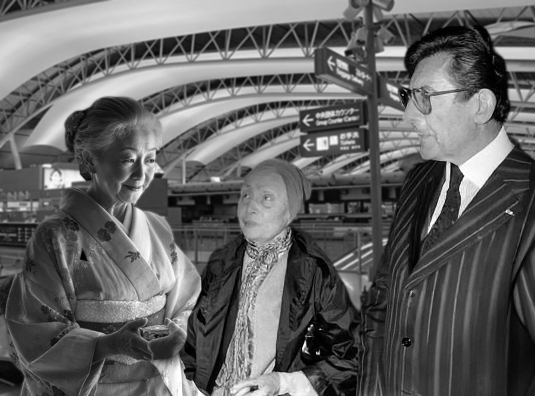 We finally reached the shores of Osaka, a vast hive of metal and wind, escorted by a cohort of journalists and a legion of models from America and France. The entire airport rustled like an ocean stirred by the tumult of currents licking the coasts of Japan: Parisian Haute Couture, arriving in a dazzling procession, awakened in the crowd a frenzy that made the security services nervous and almost fierce.
We finally reached the shores of Osaka, a vast hive of metal and wind, escorted by a cohort of journalists and a legion of models from America and France. The entire airport rustled like an ocean stirred by the tumult of currents licking the coasts of Japan: Parisian Haute Couture, arriving in a dazzling procession, awakened in the crowd a frenzy that made the security services nervous and almost fierce.
When suddenly, in this din of voices and lights, an improbable silhouette emerged: an old Japanese woman dressed in an ancestral kimono, advancing with the sacred slowness of two thousand years of history. She appeared like an apparition, a breath drawn from a Kurosawa film, a parenthesis of poetry slipped into the middle of human clamor.
For an instant, time suspended its heartbeat. Then it resumed, heavy, as the security agents, discovering that she belonged to no protocol, rushed in and stopped her just a few steps from my father. She shouted words in a language that vibrated like an ancient chant, words whose meaning he did not grasp.
“What is she saying?” Jacques Mouclier asked his interpreter.
“She is thanking you for her son, Mr. Mouclier.”
So Father signaled that she be allowed to approach. She came forward—tiny, fragile, draped in that majesty granted by the joyful suffering of mothers. Searching within her kimono, she drew out a small pillbox, delicate and pearly, and placed it in my father’s hands as one lays a treasure upon an altar.
“For you, Mouclier-san, you who made my son a respected figure beyond seas and nations… for my son, Kenzo Takada… Dōmo arigatō gozaimasu…” she repeated again and again in her voice worn thin like a golden thread by time. And her words, so simple, suddenly weighed heavier than all the finery we had brought. Never had a woman moved my father so deeply; and in the silent trembling of that air terminal, he suddenly understood that a mother’s gratitude crosses centuries, oceans, and empires as a truth stronger than glory.
FM
